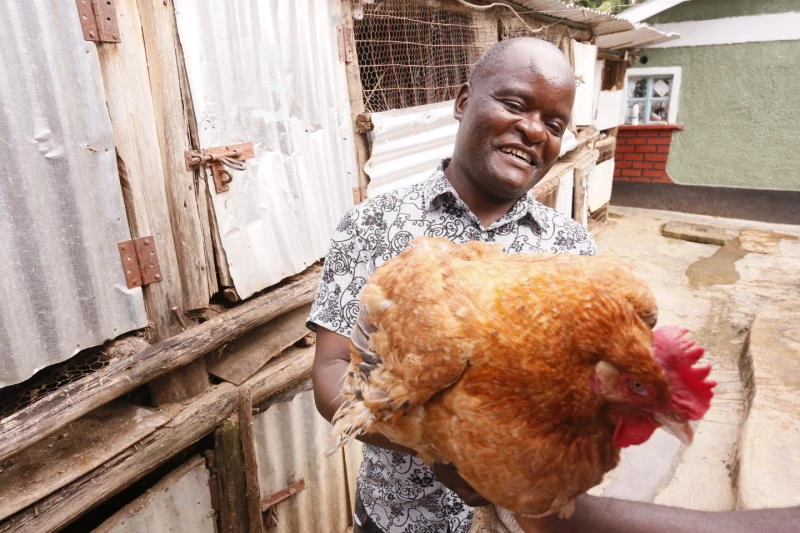Daniel Mang’ong’o, a 40-year-old farmer hailing from Muraka village in Kakamega County, has turned his three-quarter-acre farm into a thriving poultry business.
In response to the surging demand for white meat in the Kakamega region, Mang’ong’o ventured into poultry farming back in 2017, focusing on rearing an array of poultry including chickens, geese, turkeys, ducks, and guinea fowl.
What sets Mang’ong’o’s enterprise apart is his shrewd focus on indigenous hens and their fertilized eggs. He astutely observed the local preference for indigenous hens and eggs over exotic breeds.
This keen insight led him to retail eggs at his shop, fetching prices ranging from Sh20 to Sh25 each. Moreover, his sales strategy includes pricing his poultry birds differently, with male birds commanding slightly higher prices due to their weight.
Resourcefulness lies at the heart of Mang’ong’o’s success. Nothing goes to waste on his farm. The chicken droppings are ingeniously repurposed as fertilizer for his vegetable and indigenous banana crops. By composting the droppings, he creates nutrient-rich organic manure that significantly bolsters crop growth.
Mang’ong’o is no stranger to the power of knowledge. He’s dedicated to honing his craft through diligent research. His commitment to learning led him to the internet, where he uncovered techniques for identifying high-quality eggs with superior hatching potential.
To hatch these eggs, he employs a commercial incubator, with each egg incurring a Sh20 charge from the incubator owner.
Once the 21-day incubation period concludes, Mang’ong’o takes charge of the chicks, nurturing them on his farm. Rigorous vaccination routines ensure the birds’ continued health.
Discipline defines Mang’ong’o’s approach to organization. He maintains separate enclosures for varying age groups of birds, a practice that curbs cannibalism and facilitates efficient monitoring, feeding, and vaccination.
In a bid to provide optimal conditions, he strategically positions heat-emitting bulbs within the enclosures, offering vital warmth to the birds.
Mang’ong’o’s reach extends far beyond his village. Orders pour in from neighboring communities, including local villagers, schools, and hotels in the Kakamega, Siaya, and Kisumu regions.
A prosperous week might witness the sale of up to 50 birds, potentially amounting to an impressive revenue of Sh50,000.
Challenges, however, are intrinsic to poultry farming. Escalating poultry feed costs and periodic disease outbreaks have proven daunting. With a weekly feed requirement of 70 kilos, the expenses add up rapidly considering the Sh2,000 price tag on each bag.
The labor-intensive tasks of waste management, maintaining hygiene, and administering vaccines further compound the challenges.
Yet, Mang’ong’o remains steadfast in his aspirations. The setbacks have not deterred his ambitions. He envisions a future of expansion, crafting his own feed formulations, and embracing value-added processes to maximize his yields.
With prudent financial management, Mang’ong’o has procured two plots, earmarked for potential development.
As his wife wisely advised, these plots may soon house rental properties, transforming his dreams into reality. In the face of adversity, Mang’ong’o persists, an emblem of resilience and determination.

